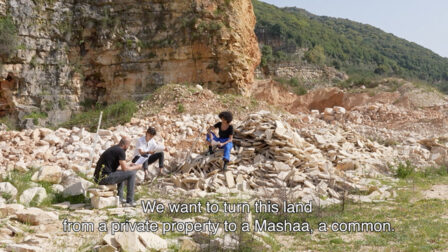Infrastructures for Artistic Research, with Marwa Arsanios & Dora García

There seems to be a certain consensus on the gradual consolidation of a singular field of research, which would be artistic or artist research. Undoubtedly, the proliferation of higher education programs in the arts and their diverse traditions have integrated the requirements of the academic reserarch into artistic training. However, to this day, it remains elusive to grasp exactly what artistic research consists of, how it takes place, and how to generate accompanying frameworks for it. With a preference for delving into details rather than falling into generalizing abstractions, this program proposes to examine two case studies that focus on the conditions of possibility of such research. That is, in the infrastructural compositions that sustain it. Each of the sessions is designed to go into detail about the methodologies, networks, processes, and resources that made it possible for each artist to investigate. Each creative process magnetizes or summons the structures in which it will develop, and part of the research process is undoubtedly the articulation of that, its infrastructure. Faced with the difficulty of finding a pattern, Infrastructures for Artistic Research opts for the aggregation of very situated analyses in order to progressively draw the contours of a field of activity within which the singularity of each piece of research must be taken into account. Perhaps this is the peculiarity of artistic research, that part of the creation is in the ways it develops, in its infrastructural conditions.
Based on this approach, we propose two case studies that show how artists have made possible processes of creation-research by hybridising disciplines and, above all, cultural and academic infrastructures.
Programme March 1st
Activity open to the public. Sala Ricson
6 p.m. – Presentation by Anna Manubens and Carolina Jiménez (Hangar)
18:10 h – Case study with Marwa Arsanios. Her practice tackles structural and infrastructural questions using different devices, forms and strategies. from architectural spaces, their transformation and adaptability throughout conflict, to artist-run spaces and temporary conventions between feminist communes and cooperatives, the practice tends to make space within and parallel to existing art structures allowing experimentation with different kinds of politics. Film becomes another form and a space for connecting struggles in the way images refer to other images.
18.50 h – Pause
19 h – Case study with Dora García. Dora García is an artist, teacher and researcher who lives and works in Oslo. She is professor at Oslo National Academy of the Arts, Norway. She has been part of the faculty of PEI Macba Barcelona (2015-2020) and has been a guest teacher in numerous educational institutions such as ENSBA Lyon, HEAD Geneva, and Le Fresnoy, Studio national des arts contemporains, France. Recently she has been the curator of Paul Klee Sommerakademie, Bern (2021-2022), and a guest teacher in IUAV, Studi performativi e di genere/ Laboratorio di performance, Venice (2022). Between 2012 and 2018 she was the co-director (with M. Villeneuve and A. Baudelot) of Les Laboratoires d’Aubervilliers, Paris, France. She has realized a great number of publications, the most recents being “Love with Obstacles/ Amor Rojo” (K.Verlag and Rose Art Museum, 2020) and “If I Could Wish for Something” (Netwerk Aalst and Fotogalleriet Oslo, 2021).
19.40 h – Q&A
Programme 2 March
At 11:00, again at Sala Ricson, a working session of the artistic research node will take place behind closed doors, where, based on the questions raised the day before, a working matrix for later iterations of the Campus de les Arts research node will be generated. This session will be coordinated by Pedro González (ESMUC) and Carolina Jiménez (Hangar).
* For both sessions a report has been commissioned to the researcher and editor Guillem Serrahima.
This is a Campus de les Arts activity proposed by Hangar. The Campus de les Arts is promoted by the University of Barcelona.

Imatge: Marwa Arsanios, Who is Afraid of Ideology? Part 4 Reverse Shot, 35 minutes, color.
Categories: Agenda Hangar | Tags: campus, Infra, infra1, recoding
